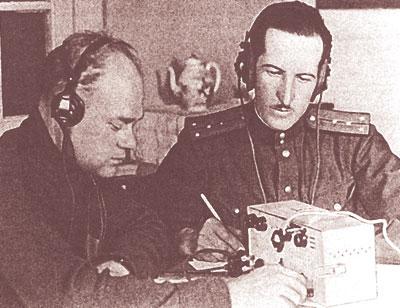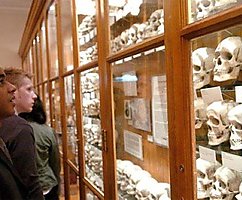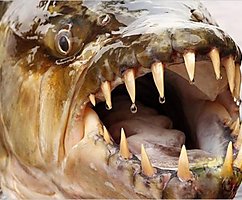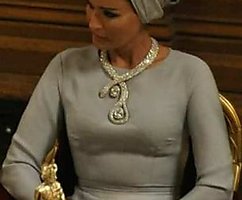Great Victory.
 Bashny.Net
Bashny.Net
Great Victory.
A little-known operation of World War II.

At the beginning of World War II there was a need to get into the Abwehr spy network operating in the territory of the USSR. You could recruited by several agents - Abwehr radio operators and use them to entice other German agents. So usually done. But firstly, this operative game could continue for a long time, and secondly, at its one could hardly pass opponent serious misinformation. Therefore, Lieutenant-General PA Sudoplatov and his aides decided to Ilyin and Maklyarsky slegendirovat existence in the USSR of some organizations, welcome the victory of the Germans and wish to help them.
Candidates underground monarchist organization soon found - they were all registered in the NKVD. Of the people with the help of agents and pro-German organization was created "See." We lived members of the organization on the territory of the Novodevichy Convent. Therefore, the operation was called "Monastery". At the same time look for the candidacy of the main party transactions - agent buyout will be replaced by the Germans. He was Alexander Petrovich Demyanov, who comes from a noble officer's family since 1929 collaborated with the security organs, proven in many cases. Before the war, he came in contact with German intelligence agents in Moscow, and this contact is so well developed that the Germans virtually Demyanova believed his agent, giving it the nickname of "Max." In the NKVD he had a pseudonym "Heine».
He was inducted into the life of the operation, "monastery", then 17 February 1942 was organized his "flight" across the front line. German counter-intelligence beginning to distrust to the "Heine". Its an addiction interrogated and examined, not trusting the stories about the existence of the "throne", on whose behalf he fled to the Germans, to ask them for help. There was even a staged firing squad, "Heine", but he held on valiantly and gave the Germans a reason to suspect him.
After Berlin had responded to the request of the front unit of the Abwehr, and that the defector was "Max" you can trust, the attitude towards him changed. German scouts, believing "Max" "his own man" began to prepare him for getting to the Soviet rear. The training was short, but very intense. He studied cryptography, cryptographic and radiodelo. Before sending him interviewed senior Abwehr. We discuss the terms of communications. We agreed that the couriers arriving in Moscow will be his test, and he will bind them with "Heine" (The test was aware of the operation).
March 15, 1942, after only 26 days after the "transition" Heine "to the Germans, he dropped by parachute over the Yaroslavl region. The tog same day he was taken to Moscow.
Two weeks later, as it was agreed to be dropped, "Heine" was aired. From that day he began his regular radio contact with German intelligence. Operation "Monastery" has developed successfully, it became clear that its capabilities extend far beyond the goals set at the beginning. Now this could be not only about catching German agents, but also but also the supply of the German large-scale misinformation, prepared at the highest level.
August 24 and October 7, 1942 to the "Heine" were promised couriers. Brought a new radio, notebooks encryption and money. Two of the four were captured couriers recruited by now "information" to the Germans went on two radio set. December 18, 1942, "Heine" and one of the radio operators were planted by the Germans Order - "Iron Cross" with swords for bravery.
Radio games continued. Couriers German intelligence increasingly coming not only in Moscow but also in other cities where "Presgol" supposedly had its strong points, in particular in Gorky, Sverdlovsk, Chelyabinsk, Novosibirsk, certainly interesting for German intelligence. Altogether during the operations of the game was captured more than 50 agents arrested seven of their accomplices, received from the Germans several million rubles.
But the main merit of the operation participants "Monastery" is to transfer a large number of excellent misinformation. The value of this "information" was defined not by employees, to conduct operations "Monastery" and the German command and leadership of British intelligence.
No less important role played by "The Monastery" and the summer campaign of 1943. "Heine" told the Germans that the Soviet troops concentrated in the south and east of Kursk, but they are not enough to maneuver, so their use is difficult. He also said that it is planned to carry out offensive operations north of the Kursk and on the southern front. The transition of Soviet troops in the Orel-Kursk to strategic defense, and then to the decisive offensive appeared to surprise the Germans, "The Battle of Kursk put the German army before the disaster", - rightly pointed out Stalin.
Officially, "Heine" worked under another name junior liaison officer and the General Staff of the Red Army. His telegrams were primarily rail transport of military units, military equipment and so on, which allowed the Germans to calculate in advance the planned actions of our army. But the leaders of the operation "Monastery" proceeded from the fact that the monitoring of the railways and this being German agents, so on these "Heine" routes under canvas covers wooden heading "tanks", "guns" and other "equipment". To confirm the message, "Heine" committed to "his people" subversive acts in the press published articles about sabotage on the railways. The information provided "Heine", divided by the information obtained by its "sources" and himself. Of course, this "his" information was poor, considering he occupied a low position.
How perceived directed "Heine" information?
In 1942 - the first half of 1944 reports "Max" to receive the station Abwehr in Sofia and Budapest. They included information about major decisions Bets on judgments Marshal Shaposhnikov and other Soviet military leaders. The former head of the Abwehr in razvedpunktov Richard Klatt these points in his testimony given by US intelligence agencies in the summer of 1945, said that reports of "Max" is highly valued in the department of "Foreign Armies East" of the General Staff of the German Army. Generally, the decisions are not taken before entering the service of the Abwehr materials "Max." General Gehlen in his postwar memoirs spoke about "the source from Moscow" as a great achievement of service Canaris.
Some employees questioned the probity of the Abwehr messages "Max", but it is generally believed that he is trustworthy. Germany's foreign intelligence chief Walter Schellenberg had some doubts about the reliability of the information "Max." He shared it with the chief of staff of land forces, General Guderian. He replied that it would be foolhardy to abandon this line because the materials are unique, and other opportunities, even standing close to this source, no.
In 1942, the Soviet intelligence was able to briefly collaborate with leading officials of the encryption service Abwehr colonel Schmitt, he managed to convey some important Abwehr intelligence material received from Moscow. In the analysis they were disinformation "Heine". Schmitt connected with British intelligence, and it gave a series of messages "Heine", designed in the form of orientations of Army Staff.
It is interesting to note that the disinformation materials "Heine" three times, returning to the Soviet state security organs. For the first time - in February 1943 - by Schmitt; Then in March of the same year - by a member of the "Cambridge Five" Blunt, who also said that the Germans are an important source in the higher spheres of the military in Moscow. And in April, gave British intelligence liaison office in London Soviet intelligence summary message "Heine" in Berlin allegedly received by our agents, while hiding that she was reading the German codes.
The fact that there is a valuable source of Abwehr at the headquarters of the Red Army, Stalin told Churchill in 1943.
Operation "Monastery" petered out in the summer of 1944, when, according to legend, "Heine" of the General Staff was sent to serve and train troops in Belarus, and in fact participated in the new radio game called "Berezina".
For the successful promotion of strategic operations of the Red Army, some employees of the state security were awarded orders and medals. The head of the operation, "monastery", Lieutenant-General PA Sudoplatov and his deputy Major General NI Eitingon was awarded the Order of Suvorov that the system of public security was the only time. Sam "Heine" - Alexander P. Demyanov - received the Order of the Red Star and his wife, Tatyana G. Berezantseva, and her father - the medal "For Service in Battle".
A little-known operation of World War II.

At the beginning of World War II there was a need to get into the Abwehr spy network operating in the territory of the USSR. You could recruited by several agents - Abwehr radio operators and use them to entice other German agents. So usually done. But firstly, this operative game could continue for a long time, and secondly, at its one could hardly pass opponent serious misinformation. Therefore, Lieutenant-General PA Sudoplatov and his aides decided to Ilyin and Maklyarsky slegendirovat existence in the USSR of some organizations, welcome the victory of the Germans and wish to help them.
Candidates underground monarchist organization soon found - they were all registered in the NKVD. Of the people with the help of agents and pro-German organization was created "See." We lived members of the organization on the territory of the Novodevichy Convent. Therefore, the operation was called "Monastery". At the same time look for the candidacy of the main party transactions - agent buyout will be replaced by the Germans. He was Alexander Petrovich Demyanov, who comes from a noble officer's family since 1929 collaborated with the security organs, proven in many cases. Before the war, he came in contact with German intelligence agents in Moscow, and this contact is so well developed that the Germans virtually Demyanova believed his agent, giving it the nickname of "Max." In the NKVD he had a pseudonym "Heine».
He was inducted into the life of the operation, "monastery", then 17 February 1942 was organized his "flight" across the front line. German counter-intelligence beginning to distrust to the "Heine". Its an addiction interrogated and examined, not trusting the stories about the existence of the "throne", on whose behalf he fled to the Germans, to ask them for help. There was even a staged firing squad, "Heine", but he held on valiantly and gave the Germans a reason to suspect him.
After Berlin had responded to the request of the front unit of the Abwehr, and that the defector was "Max" you can trust, the attitude towards him changed. German scouts, believing "Max" "his own man" began to prepare him for getting to the Soviet rear. The training was short, but very intense. He studied cryptography, cryptographic and radiodelo. Before sending him interviewed senior Abwehr. We discuss the terms of communications. We agreed that the couriers arriving in Moscow will be his test, and he will bind them with "Heine" (The test was aware of the operation).
March 15, 1942, after only 26 days after the "transition" Heine "to the Germans, he dropped by parachute over the Yaroslavl region. The tog same day he was taken to Moscow.
Two weeks later, as it was agreed to be dropped, "Heine" was aired. From that day he began his regular radio contact with German intelligence. Operation "Monastery" has developed successfully, it became clear that its capabilities extend far beyond the goals set at the beginning. Now this could be not only about catching German agents, but also but also the supply of the German large-scale misinformation, prepared at the highest level.
August 24 and October 7, 1942 to the "Heine" were promised couriers. Brought a new radio, notebooks encryption and money. Two of the four were captured couriers recruited by now "information" to the Germans went on two radio set. December 18, 1942, "Heine" and one of the radio operators were planted by the Germans Order - "Iron Cross" with swords for bravery.
Radio games continued. Couriers German intelligence increasingly coming not only in Moscow but also in other cities where "Presgol" supposedly had its strong points, in particular in Gorky, Sverdlovsk, Chelyabinsk, Novosibirsk, certainly interesting for German intelligence. Altogether during the operations of the game was captured more than 50 agents arrested seven of their accomplices, received from the Germans several million rubles.
But the main merit of the operation participants "Monastery" is to transfer a large number of excellent misinformation. The value of this "information" was defined not by employees, to conduct operations "Monastery" and the German command and leadership of British intelligence.
No less important role played by "The Monastery" and the summer campaign of 1943. "Heine" told the Germans that the Soviet troops concentrated in the south and east of Kursk, but they are not enough to maneuver, so their use is difficult. He also said that it is planned to carry out offensive operations north of the Kursk and on the southern front. The transition of Soviet troops in the Orel-Kursk to strategic defense, and then to the decisive offensive appeared to surprise the Germans, "The Battle of Kursk put the German army before the disaster", - rightly pointed out Stalin.
Officially, "Heine" worked under another name junior liaison officer and the General Staff of the Red Army. His telegrams were primarily rail transport of military units, military equipment and so on, which allowed the Germans to calculate in advance the planned actions of our army. But the leaders of the operation "Monastery" proceeded from the fact that the monitoring of the railways and this being German agents, so on these "Heine" routes under canvas covers wooden heading "tanks", "guns" and other "equipment". To confirm the message, "Heine" committed to "his people" subversive acts in the press published articles about sabotage on the railways. The information provided "Heine", divided by the information obtained by its "sources" and himself. Of course, this "his" information was poor, considering he occupied a low position.
How perceived directed "Heine" information?
In 1942 - the first half of 1944 reports "Max" to receive the station Abwehr in Sofia and Budapest. They included information about major decisions Bets on judgments Marshal Shaposhnikov and other Soviet military leaders. The former head of the Abwehr in razvedpunktov Richard Klatt these points in his testimony given by US intelligence agencies in the summer of 1945, said that reports of "Max" is highly valued in the department of "Foreign Armies East" of the General Staff of the German Army. Generally, the decisions are not taken before entering the service of the Abwehr materials "Max." General Gehlen in his postwar memoirs spoke about "the source from Moscow" as a great achievement of service Canaris.
Some employees questioned the probity of the Abwehr messages "Max", but it is generally believed that he is trustworthy. Germany's foreign intelligence chief Walter Schellenberg had some doubts about the reliability of the information "Max." He shared it with the chief of staff of land forces, General Guderian. He replied that it would be foolhardy to abandon this line because the materials are unique, and other opportunities, even standing close to this source, no.
In 1942, the Soviet intelligence was able to briefly collaborate with leading officials of the encryption service Abwehr colonel Schmitt, he managed to convey some important Abwehr intelligence material received from Moscow. In the analysis they were disinformation "Heine". Schmitt connected with British intelligence, and it gave a series of messages "Heine", designed in the form of orientations of Army Staff.
It is interesting to note that the disinformation materials "Heine" three times, returning to the Soviet state security organs. For the first time - in February 1943 - by Schmitt; Then in March of the same year - by a member of the "Cambridge Five" Blunt, who also said that the Germans are an important source in the higher spheres of the military in Moscow. And in April, gave British intelligence liaison office in London Soviet intelligence summary message "Heine" in Berlin allegedly received by our agents, while hiding that she was reading the German codes.
The fact that there is a valuable source of Abwehr at the headquarters of the Red Army, Stalin told Churchill in 1943.
Operation "Monastery" petered out in the summer of 1944, when, according to legend, "Heine" of the General Staff was sent to serve and train troops in Belarus, and in fact participated in the new radio game called "Berezina".
For the successful promotion of strategic operations of the Red Army, some employees of the state security were awarded orders and medals. The head of the operation, "monastery", Lieutenant-General PA Sudoplatov and his deputy Major General NI Eitingon was awarded the Order of Suvorov that the system of public security was the only time. Sam "Heine" - Alexander P. Demyanov - received the Order of the Red Star and his wife, Tatyana G. Berezantseva, and her father - the medal "For Service in Battle".
Tags
See also
Photos of Great Patriotic War
The new Museum of the Great Patriotic War in Minsk
5 facts about the Great Patriotic War
Great feat Nicholas Sirotina
Soviet actors - participants of the Great Patriotic War (22 photos)
Myths about the Great Patriotic War
Soviet posters of the Great Patriotic War
Minsk during the Great Patriotic War vs today (40 photos)
Mystery of the Great Patriotic War
30 famous images of the great Patriotic war
















